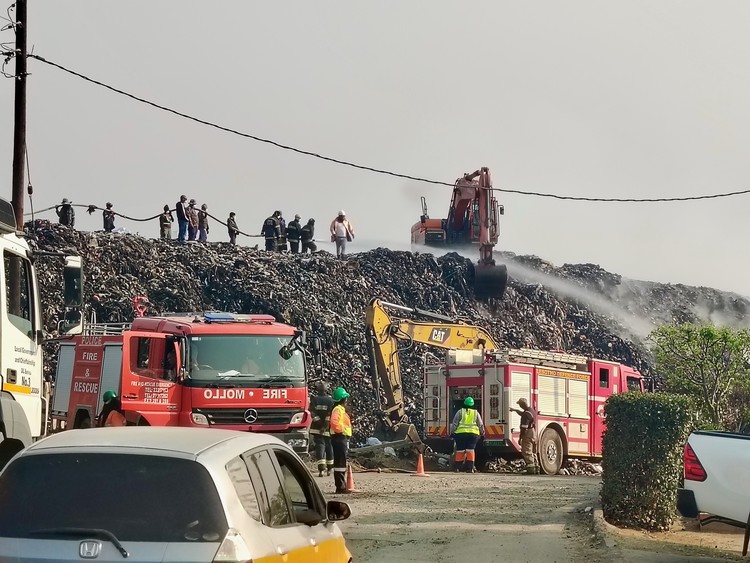Maseru dump site to be closed after community goes to court
Ha Tšosane residents have lived next to mountains of waste for years
The Tšosane dump site in Maseru during recent fires. Photo: Sechaba Mokhethi
After years of living next to mountains of waste, residents of Ha Tšosane in Maseru have reached an agreement that will see the dump site, which has bedevilled the community for decades, permanently closed.
Residents led by applicants Taole Mangope, Mampolokeng Thamae and six others filed a court application in 2022, arguing that the Maseru City Council’s continued dumping at the site violated their constitutional rights to a clean and healthy environment.
Court papers detailed how families were being “literally choked” by plumes of smoke, had to endure bad odours, and live at constant risk of airborne, waterborne and soilborne diseases.
Recent fires, which left villagers choking on smoke in September, spurred on the settlement reached last week.
The City and key government ministries will see the site shut down, stabilised, and rehabilitated. A new sanitary landfill will be built elsewhere. The government has already committed M20-million (M1 = R1) to fund the work.
The project – formally titled the Tšosane Dumpsite Stabilisation, Rehabilitation and Closure and Tšoeneng Sanitary Landfill First Phase Design and Construction – will run until October 2028. Plans include recreational facilities and a biogas plant.
The City is required to implement immediate interim measures to reduce health risks. These include daily covering of waste with soil to reduce odour and vermin, a documented pest-control programme, and strict fire-prevention controls.
To monitor progress and ensure accountability, a Ha Tšosane rehabilitation oversight committee will be established. It will include three representatives chosen by the community, alongside officials from the City and key ministries. The City must report to both the committee and the court every four months.
The settlement also mandates a full environmental and health impact assessment. Government-appointed experts, paid by the state, will examine the extent of pollution-related damage.
Residents have been assured they may seek medical evaluation at public or private health centres to assess the effects of their long-term exposure to contaminated air, water and soil.
In another win for the community, the project must offer Ha Tšosane residents priority access to jobs created during construction, especially those requiring minimal or no specialised skills.
The agreement further obliges the state to ensure uninterrupted funding throughout the multi-phase project.
All parties have signed the agreement, and it being made an order of the court is now pending.
Support independent journalism
Donate using Payfast

Don't miss out on the latest news
We respect your privacy, and promise we won't spam you.
Next: Part Two: Dodgy Nguni cattle deals uncovered at Fort Hare
Previous: Naidoo family breaks down in court as police brutality case postponed yet again
© 2025 GroundUp. This article is licensed under a Creative Commons Attribution-NoDerivatives 4.0 International License.
You may republish this article, so long as you credit the authors and GroundUp, and do not change the text. Please include a link back to the original article.
We put an invisible pixel in the article so that we can count traffic to republishers. All analytics tools are solely on our servers. We do not give our logs to any third party. Logs are deleted after two weeks. We do not use any IP address identifying information except to count regional traffic. We are solely interested in counting hits, not tracking users. If you republish, please do not delete the invisible pixel.

